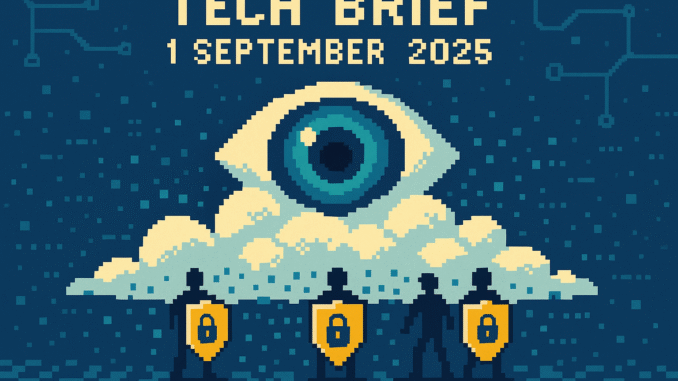
Tech Brief 1 September 2025 lands with a brisk scan of British tech policy, cloud privacy disputes, digital policing, and the uneasy side of encrypted messaging. No forced themes today; sometimes the only thread is the knot in your stomach. Missed yesterday’s Tech Brief? Catch up here before diving in.
Home Office Pushes for Global Backdoor in Apple iCloud
“The Home Office wants worldwide reach.” That sits at the centre of new UK court filings. The government is seeking legal authority for a backdoor to Apple’s iCloud, giving officials access to user data and metadata everywhere, not just in Blighty. Privacy campaigners spot similarities to the early internet “crypto wars,” when dial-up forums warned of government snooping. Apple, which has often resisted such requests, faces a public reputational test. For anyone who remembers clipping lines or phone hacking, the struggle feels familiar; just swap those for seamless cloud sync. For now, the legal wrangling plays out in the open, not behind closed doors, and the outcome could reset global user expectations around privacy. When the kit is in someone else’s hands, what does safety really look like?
Merseyside Police Integrates Facial Recognition to Boost Patrol Time
Ask yourself: Does a police officer need facial recognition? Merseyside’s new chief constable, Rob Carden, argues that high-tech tools like automated identification will free officers from paperwork, putting human patrols back in local communities. The tech, once confined to speculative fiction or the world’s spruced-up airports, now enters daily policing. Carden insists it will not replace people but support them. Local forums are divided. Some see innovation, others another step into monitored living. There’s a nod to history here. When Beat officers relied on memory, not machine learning, outcomes felt direct. Still, policing is in motion. The kit may be smarter and the questions less tidy. For now, the experiment belongs to Liverpool’s streets, not London’s committee rooms.
WhatsApp Cyberespionage Shows Flaws in “Secure” Messaging
A targeted WhatsApp hacking campaign exposed security holes in both the app and in Apple hardware, hitting under 200 users but spotlighting instant message vulnerability. WhatsApp’s team uncovered a chain of advanced threats able to bypass multiple defences, which jars against the app’s “end-to-end encrypted” claims. The incident punches a hole in the myth of untouchable privacy. Even the most closely guarded systems can falter when high-level attackers find a way in. Industry watchers recall the days of secret BBS chats and floppy disks marked “strictly private.” That urge to keep conversations safe is as old as punched tape, but the tools and the stakes have evolved. As seen with the Home Office story above, the back and forth between security and surveillance is growing more complex by the year.
Technology Reshapes Northern England’s Boardrooms, Says KPMG
KPMG’s North East corporate finance chief, Michael Downes, says digital transformation now moves deals faster than ever. Tech investment is overtaking traditional manufacturing in speed and scale. Northern England’s factories and service sectors, once defined by coal and textiles, are chased by AI and cloud tools. Mergers and acquisitions in tech are outpacing old models, giving the region a new blend of classic grit and algorithmic power. Downes points to deal flow statistics and boardroom anecdotes; there’s a pulse of change in Newcastle, Sunderland, even towns once painted as “post-industrial.” Local businesses are not just keeping pace. They are reimagining what it means to build and buy in a connected world.
From the Wayback Machine
On This Day: 1994 – The US Library of Congress hosted its first meeting on the “Virtual Library” project, laying plans to digitise millions of archives. Early hopes focused on distributing rare materials via LaserDisc and CD-ROM. As the web became mainstream, the Library’s focus shifted to online access, with American Memory and ndlp.loc.gov becoming early resources for researchers worldwide. These standards shaped how digital knowledge is preserved and shared, influencing how we all search, save, and learn online.
What This Means
Tech Brief 1 September 2025 shows history repeating, sometimes with the dial turned higher. Whether you care about backdoors, boardrooms, or the slow creep of facial recognition onto your local high street, today’s urgent question is whether transparency and inclusion can keep up with the machinery of progress or will we keep stumbling over the same cables?
Curiosity is an old habit. Take five minutes today and see what you find behind the login screen; just mind the cookies.
Missed yesterday’s Tech Brief? Catch up here

Leave a Reply